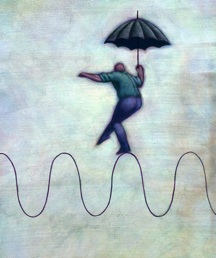
My absolute favorite essay on depression is a piece Kay Redfield Jamison wrote for NPR’s “This I Believe” collection of testimonies. It’s about learning to love our jagged edges.
I believe that curiosity, wonder and passion are defining qualities of imaginative minds and great teachers; that restlessness and discontent are vital things; and that intense experience and suffering instruct us in ways that less intense emotions can never do. I believe, in short, that we are equally beholden to heart and mind, and that those who have particularly passionate temperaments and questioning minds leave the world a different place for their having been there. It is important to value intellect and discipline, of course, but it is also important to recognize the power of irrationality, enthusiasm and vast energy. Intensity has its costs, of course — in pain, in hastily and poorly reckoned plans, in impetuousness — but it has its advantages as well.
Like millions of Americans, I was dealt a hand of intense emotions and volatile moods. I have had manic-depressive illness, also known as bipolar disorder, since I was 18 years old. It is an illness that ensures that those who have it will experience a frightening, chaotic and emotional ride. It is not a gentle or easy disease. And, yet, from it I have come to see how important a certain restlessness and discontent can be in one’s life; how important the jagged edges and pain can be in determining the course and force of one’s life.
I have often longed for peace and tranquility — looked into the lives of others and envied a kind of calmness — and yet I don’t know if this tranquility is what I truly would have wished for myself. One is, after all, only really acquainted with one’s own temperament and way of going through life. It is best to acknowledge this, to accept it and to admire the diversity of temperaments Nature has dealt us.
Exuberance and delight, tempered by deep depressions, have been lasting teachers. An intense temperament has convinced me to teach not only from books but from what I have learned from experience. So I try to impress upon young doctors and graduate students that tumultuousness, if coupled to discipline and a cool mind, is not such a bad sort of thing. That unless one wants to live a stunningly boring life, one ought to be on good terms with one’s darker side and one’s darker energies. And, above all, that one should learn from turmoil and pain, share one’s joy with those less joyful and encourage passion when it seems likely to promote the common good.

